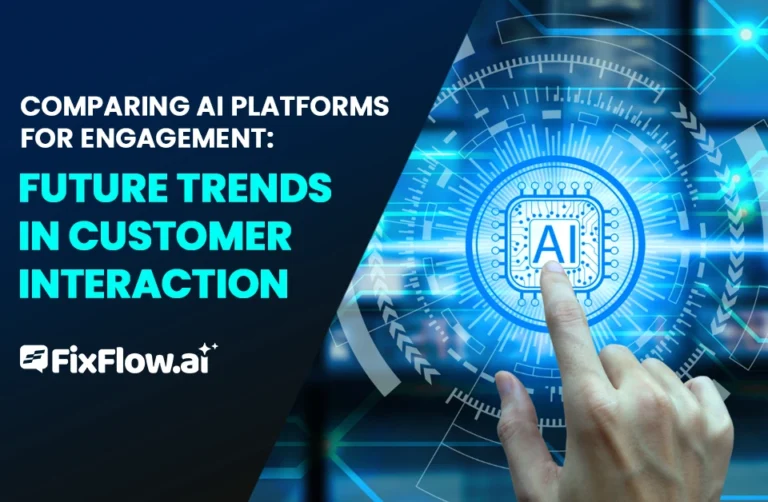How AI Is Shaping the Future of Financial Services
AI is revolutionizing financial services by making them more efficient and personalized. You’re experiencing this through AI-driven customer experiences, where chatbots and virtual assistants provide seamless communication. Fraud detection is smarter, using machine learning to spot unusual activity before it becomes problematic. Risk assessments are automated, promoting quicker, unbiased decisions. In investments, AI helps identify market trends, optimizing portfolios for better returns. Regulatory compliance is simplified, with AI and RPA taking over complex tasks. As AI shapes the financial landscape, exploring its various applications offers a glimpse into the future of how financial services are evolving.
Transforming Customer Experience
In today’s fast-paced financial landscape, AI revolutionizes customer experience by making interactions more efficient and personalized. Financial institutions increasingly utilize natural language processing (NLP) to enhance customer engagement. Chatbots and virtual assistants powered by NLP allow you to communicate seamlessly with your bank, answering your queries and facilitating transactions without the usual hold times. This automation improves efficiency and guarantees that you receive personalized financial services tailored to your specific needs.
Banks can now analyze your financial behavior more accurately through data-driven insights, offering products that align with your preferences and financial goals. This level of personalization was previously unimaginable, but AI makes it possible by sifting through vast amounts of data quickly and effectively. As a customer, you benefit from services that are not only faster but also more relevant to your financial journey.
AI’s ability to transform customer experience doesn’t stop at personalization and engagement. It also enables institutions to anticipate your needs and respond proactively, creating a seamless experience that keeps you satisfied and loyal. Embrace these changes as they reshape your financial interactions.
Enhancing Fraud Detection
While AI enhances the customer experience by personalizing interactions, it also significantly strengthens fraud detection. With the rise of machine learning, financial institutions can now analyze vast amounts of data quickly and accurately. Predictive analytics allow you to identify suspicious patterns and anomalies that may indicate fraudulent activities before they happen, effectively staying one step ahead of fraudsters.
Machine learning models learn from historical data and continuously improve, making fraud detection more efficient and reliable. This means you can better protect your customers’ financial assets while maintaining data privacy and security. You’re not just reacting to fraud as it occurs; you’re actively predicting and preventing it.
In addition to enhancing fraud detection, AI helps guarantee regulatory compliance by automatically monitoring transactions for suspicious activities. This reduces the burden of manual checks and minimizes human error, allowing your team to focus on more strategic tasks. However, with AI’s capabilities come responsibilities, particularly regarding data privacy and security. Safeguarding personal information while leveraging AI’s potential is vital to maintaining trust and compliance. Integrating AI into your fraud detection strategy builds a more secure, trustworthy financial environment.
Automating Risk Assessment
One of the most significant advancements AI brings to financial services is risk assessment automation. Imagine transforming the way you evaluate risks, moving from a labor-intensive process to one that’s efficient and accurate. With machine learning at the core, you can swiftly analyze vast amounts of data and uncover patterns humans might overlook. This revolution in financial technology allows you to harness data analytics to assess risks more precisely, minimizing errors and enhancing decision-making.
By automating risk assessment, you’re saving time and improving the quality of your evaluations. AI-driven tools can process complex data sets, offering insights that help you make informed decisions. These tools learn and adapt, making your risk assessments more accurate over time. With financial technology evolving rapidly, automation is essential for staying competitive.
Integrating automation into your risk assessment process also reduces human bias, guaranteeing a more objective analysis. This shift boosts your operational efficiency and strengthens your overall financial strategy. Embracing AI in this way ensures you’re equipped to handle the complexities of modern financial landscapes with confidence and precision.
Revolutionizing Investment Strategies
As you embrace the power of AI in automating risk assessment, you set the stage for transforming your investment strategies with unprecedented precision. Artificial intelligence is at the forefront of innovation, allowing you to dive deep into market analysis and uncover insights that were once hidden. By leveraging financial technology, you can deploy algorithmic trading systems that react swiftly to market shifts, maximizing returns while minimizing risks. These innovative strategies enable you to stay ahead in the ever-evolving financial landscape.
With AI, you cannot only follow trends but also predict them. It provides an unparalleled ability to analyze vast amounts of data at lightning speed, identifying patterns and anomalies that human analysis might miss. This empowers you to make informed decisions and optimize your investment portfolio in previously unimaginable ways. As a result, you can tailor your strategies to align with market conditions and your specific financial goals.
Integrating AI into your investment approach enhances efficiency—it revolutionizes it. Embrace these advancements, and you’ll be at the cutting edge of investment strategy development, ready to capitalize on opportunities with confidence and precision.
Streamlining Regulatory Compliance
In today’s fast-paced financial landscape, regulatory compliance can be challenging, but AI offers a streamlined solution. If you’re in the financial sector, you know the pressure to meet strict regulations while maintaining operational efficiency. Artificial intelligence and robotic process automation (RPA) transform how compliance is managed. By adopting this technology, you can automate repetitive tasks, reduce human error, and guarantee accuracy in reporting.
Imagine the time saved when AI handles data collection and analysis for compliance reports. Instead of manually sifting through mountains of information, AI systems quickly process and organize data, highlighting potential compliance issues before they become significant problems. With RPA, repetitive processes like data entry and validation are executed swiftly, freeing your team to focus on strategic activities.
Moreover, embracing technology adoption means you’re not just keeping up with regulations but staying ahead. AI-driven insights can identify new patterns and trends in regulatory requirements, allowing your organization to adapt proactively. Integrating AI into your compliance strategy enhances operational efficiency and future-proofing your financial institution in an ever-evolving regulatory environment.
Frequently Asked Questions
How Is AI Improving Credit Scoring Reliability?
You may wonder how AI is making credit scoring more reliable. Well, it’s all about processing vast amounts of data quickly and accurately. AI algorithms analyze diverse data points, going beyond traditional credit histories to include alternative data like payment patterns and social behavior. This thorough analysis helps predict creditworthiness more accurately, reducing risks for lenders and offering fairer assessments for borrowers. It’s a win-win for everyone involved!
What Challenges Exist in Ai-Driven Data Privacy for Finance?
You face significant challenges in AI-driven data privacy for finance. First, you must comply with regulations like GDPR, which can be tricky. Protecting sensitive financial data is essential but not always straightforward. Then, there’s the risk of data breaches, which can undermine trust. You must also guarantee that your AI systems don’t inadvertently introduce biases or security vulnerabilities into your processes. Balancing these aspects is key.
How Does AI Integration Affect Existing Financial IT Systems?
When you integrate AI into existing financial IT systems, you might face challenges like compatibility issues and the need for infrastructure upgrades. Ensuring a smooth shift is essential, so consider strategies like phased implementation and staff training. AI can enhance efficiency, but you must address potential workflow disruptions. Balancing innovation with system stability is key to releasing AI’s full potential without compromising your current operations.
What Ethical Considerations Are Important for AI in Finance?
Ethical considerations are vital when dealing with AI in finance. AI algorithms must be transparent to avoid hidden biases that could lead to unfair decisions. Data privacy concerns must also be addressed, especially when handling sensitive financial information. Compliance with regulations like GDPR is essential. Focusing on these areas will create a more trustworthy and equitable economic system for everyone involved.
What Long-Term Impacts Will AI Have on Financial Sector Job Roles?
You’re likely wondering how AI will change job roles in finance in the long term. Expect a shift towards more data-driven positions and a demand for tech-savvy professionals. Routine tasks will become automated, freeing you to focus on strategic decision-making and innovation. You’ll need to upskill continuously, learning about AI tools and data analytics. Embrace lifelong learning to stay relevant as AI reshapes roles, creating opportunities for those who adapt.




